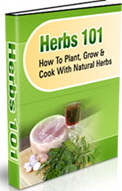Archive for January, 2012
Health Benefits of Natural Herbs
Natural Herbs Can Be A Healthy Part Of Your Lifestyle
While the use of natural herbs to improve one’s health has recently enjoyed a surge in popularity, the health benefits of natural herbs has been known throughout the world since prehistoric times. Many people throughout history have used herbs as medicines. Ancient histories describe medicinal uses for many different herbs, and many of those same herbs are used today to treat the same ailments. Modern chemical drugs and medicine are based quite a bit on early herbal medicine practices, and many of our drugs have extracts or essences of plants as some of their key ingredients. While chemical drugs have overshadowed herbal medicines in the modern era, many people are beginning to see the health benefits of natural herbs, especially when applied to a holistic wellness approach.
Understanding what herbs are and their known benefits may encourage you to begin to use these natural elements to increase your own wellness. The particular herbs used to tread medical conditions in ancient times often depended on the local vegetation, but with our global economy, it is much easier to access herbs from all over the world. Herbs come from leafy plants and many are used to flavor foods. However, some of these same herbs can have wonderful effects on the body. For instance, garlic can cause a modest reduction in high blood pressure, and green tea and Oolong tea can have been shown to cut the risks of getting high blood pressure up to 65%.
The health benefits of natural herbs for diabetes have also been researched, and Gymnema has been shown to stimulate the pancreas so that more insulin is produced. In addition, Fenugreek, which was used by ancient Romans and Greeks to treat diabetes, has been shown to lower the blood glucose levels and the insulin levels as well as overall cholesterol levels. Bitter melon, bilberry, and grapeseed extract have been shown to benefit and strengthen the capillaries, which aids the damage to small blood vessels which is one complication that is linked to diabetes. There are many other conditions that respond favorably to natural herbs.
As you learn more about natural herbs, you will see that the majority of herbs are very safe and if your body doesn’t need what they provide, they will simply pass through your body without causing any harm. You can also substitute healthy herbs in many of your recipes in the place of less healthy ingredients to make the meals you eat much healthier. For instance, using garlic and other herbs in the place of salt or butter can be a very healthy substitution. Learning to cook with herbs can really enhance the flavor of your foods. Over time, you may find that you really prefer the flavors of the herbs you are using over the fatty or unhealthy condiments you used to use to get more flavor out of your foods.
As you can see, there are many health benefits of natural herbs that have been known for centuries. By augmenting your current healthy lifestyle with herbs that can prevent or help control illness, you can improve not only your overall health but also your quality of life.
Article Source: https://EzineArticles.com/6805578
Winter Home Herb Gardens
Spring is that time of year when the weather starts allowing us to get back to our outdoor activities. A lot of us include herb gardening in those activities and late Winter / early Spring is the ideal time to start your herb garden so you can reap its rewards throughout the Summer months. But are we limited to just those few months to enjoy our own fresh herbs? Not necessarily since most herbs can be grown in containers and can be brought indoors when the weather turns cold and inclement. No need to give up your home grown flavor for cooking. In fact, by bringing them indoors, you can add the fresh aroma of living plants into your home. The climate is controlled for easier growing as well. With a little care, you don’t have to give up fresh savory taste just because old man winter comes calling.
If you don’t already have herbs planted in containers to bring inside for winter, here are a couple of ways to grow an indoor herb garden. One is to set aside a small area in your home, then buy seeds, containers, organic soil, and for best results, a grow light or two. Fill the containers 3/4 full with soil, plant the seeds as directed on the seed package. Water regularly, but be careful not to over water. Set the grow light(s), or at minimum a fluorescent light, to be on at least 6-8 hours a day and withing a couple of weeks you should start seeing the plants sprouting. After a few more weeks, or until they get about 4 inches high, the plants will be ready for use in your kitchen. Another method that is gaining in popularity is hydroponics. If you have the patience and know how, you can build your own hydroponic unit, or an even easier way is to purchase one of the many tabletop hydroponic units on the market today. The most popular being the Aerogarden which comes in many varieties of plant options.
Either way you will be assured of fresh herbs for all your winter dishes, and that makes it worth it.

